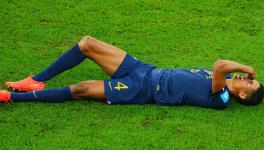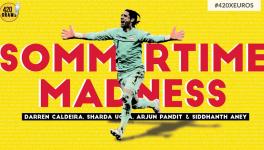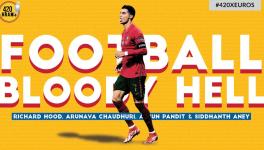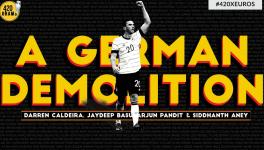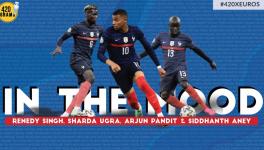Immigrant Father On What France's World Cup Win Means for Him and His Son
French football fans celebrate the victory of their FIFA World Cup-winning national team at the Champs-Élysées in Paris (Pic: IANS)
France is ecstatic, celebrating the FIFA World Cup victory, honouring the players of a multi-ethnic national football team who, with or without the coveted trophy in their hands, are a true reflection of French society at the moment.
There is no grey area to this -- without an Antoine Griezmann, Nabil Fekir, Kylian Mbappe, Paul Pogba, N’Golo Kante, Raphael Varane and the rest, France would not have won in Russia. And, despite the fact that most of this lot have non-French origins, they are part of France in every sense possible.
Ethnicity, in modern times, is multi-layered, and shouldn’t be mixed with national identity. Maybe in terms of outward appearance (color and name for instance) the current France football team players may not look like the established and accepted stereotype of a French man -- white, may have blond or brown hair, and of short stature. The team may have some players that can fit this bill but the majority were non-French by ‘appearance’.
Also Read | Kylian Mbappe, the Future of Football? Not Yet
But appearances are deceptive, as we know, and it hardly matters in the France that I have experienced. The pertinent question here is ‘identity’. What does it mean to be French and who is recognized as French? This question is highly relevant for French society in general, and personally for me.
I am an Indian who has been living and working in France for the last 10 years. My son, who is seven years old, is French and his mom is French (a White French). However, my son has light-brown skin, dark hair, and may not fit into the stereotype of a French male.
But, it is a fact that he is growing up in a French environment, his friends are French, obviously his mother tongue is French, and he is going to school in France. He is comfortable in India as well -- he can manage spicy food, he understands and speaks Malayalam, which happens to be my mother tongue, but essentially, he is French.
Also Read | FIFA World Cup: Black or White? Les Bleus are French in Colour
Even though he is not an ardent follower of football, he was interested in knowing how the French team was performing during this World Cup. He was watching the final with a lot of passion and energy, and was very happy that his team won.
Does being brown and dark-haired make him less French than his classmates who have white skin? I feel that such an assumption, if someone makes (many have made during the course of this World Cup when the question cropped up) is based on the limited understanding and narrow vision about humans, social evolution and human history.
I have not heard or seen any discriminatory treatment, verbally or otherwise, towards my son at school or at the Judo club where he trains.
One of the primary reasons for that is the sporting culture France promotes. The prominent role sport has in French society helps in encouraging acceptance early on in the life of a kid. The sports club system and network in France help children try various kinds of sports -- with state-of-the-art facilities and high-quality coaching -- for very nominal fees. There is a well-established support system to help talented children focus on sports and reach their potential.
Also Read | World Cup: Lukaku, Mbappe and the Colonial Ghosts Within Belgium and France
This well-oiled system helps parents to get their children to try out different sports activities and finally choose the one which matches his or her aptitude and abilities. If you have talent, it is possible to go forward and become a professional in this field.
This holds true outside of sports as well, in the field of arts, academics, or anything else.
On a personal front, being an immigrant from India, I have not faced any situation of discrimination in France. I am currently working as a visiting lecturer at different business schools in France, and I am very much accepted in my social and professional circle. For them, I am an Indian teacher bringing in international experience and expertise, as well as a multicultural approach to business studies.
So from my own experience, it is hard to say there is a climate of resistance against immigrants or children of immigrants which stops them from developing into successful individuals in the society, and this World Cup victory is a testament of that, a symbol of that.
Of course, there are political parties and a minority group in the population who doesn’t like immigrants, because, according to them, the ‘Frenchness’ of French culture is getting diluted by the newcomers.
Also Read | Switzerland’s Albanian-origin Goalscorers Sting Serbia with Nationalist Celebrations
It was visible during last year’s French presidential elections as well, and also during the recent Italian parliamentary election, where various Far-Right, Anti-EU, Anti-migrant political parties either reached the final rounds or won the elections.
The European Union is going through immense political, social and economic pressure from illegal immigration, making it a much more complex problem. However, bringing such politically charged and racially discriminating comments and discussion in the context of the World Cup should be viewed as a misunderstanding about French society rather than an outright racist rant.
Luckily, such rhetoric remains the minority as of now. Today, France means a mix of different colors and ethnic origins and this is not looked upon as a curse. It is a strength, which, if used in a creative and productive manner, like the Les Bleus at the 2018 FIFA World Cup or the 1998 edition, then the possibilities are limitless.
At this point, at the risk of sounding archaic, I say that one should remember the French state’s slogan: ‘Liberty, Equality, and Fraternity’! That slogan is in its most relevant state now, since the revolution, especially when one looks at the current socio-political, economic and geopolitical context of Europe, especially with the rise of Extreme-Right Wing political movements, increased immigration, refugee crisis and low economic growth.
And this is where sports comes in. The integral way in which sports is part of the French society has acted as a bridge, opening people up to understand the culture, composition and evolution of other countries and societies and assimilating the best of everything.
And I firmly believe, from my experience, that my son will pursue his dreams without any inhibition or fear, like one of those daring Mbappe runs which he cheered and enjoyed during the World Cup.
(The writer is a lecturer on Geopolitics and Cross Cultural Management at INSEEC (L'Institut des Hautes Études Économiques et Commerciales in Lyon, France. The opinions expressed are personal)
Get the latest reports & analysis with people's perspective on Protests, movements & deep analytical videos, discussions of the current affairs in your Telegram app. Subscribe to NewsClick's Telegram channel & get Real-Time updates on stories, as they get published on our website.









